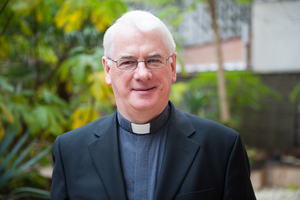
By Cian Molloy - 26 March, 2017
 Celebrations marking the 60th anniversary of the Treaty of Rome, which ultimately led to the foundation of the European Union (EU), commenced with a prayerful meeting of EU leaders in the Vatican’s Sistine Chapel on Friday.
Celebrations marking the 60th anniversary of the Treaty of Rome, which ultimately led to the foundation of the European Union (EU), commenced with a prayerful meeting of EU leaders in the Vatican’s Sistine Chapel on Friday.
The forerunner of the EU, the European Economic Community (EEC), was founded in 1957 when a treaty of cooperation on economic issues, such as agricultural and fisheries policy, was signed by Belgium, France, Italy, Luxembourg, the Netherlands and West Germany. Denmark, Ireland and the UK joined the EEC in 1975, and since then it has become the EU, with closer political ties than ever before. It now has 28 member states.
In the run-up to the referenda in Ireland and the UK about joining the EEC, many fundamentalist Protestant politicians, including the Rev Ian Paisley (who later became a member of the European Parliament), campaigned against joining the community because they saw it as “a Papish plot”, not just because the founding treaty was signed in Rome, but because many of the French, German and Italian politicians who worked to establish the EEC and its forerunner, the Coal and Steel Treaty, were Catholics and active Christian Democrats.
Such sectarian name-calling aside, on a continent that suffered two devastating world wars in the first half of the 20th century, some would say who cares what the background of those who helped found the EU was. For the last 60 years, it has given us peace and prosperity!
Nevertheless, because Catholic social teaching inspired the movement towards European Unity, it was appropriate that the Pope should address the leaders of 27 EU states in Rome on Friday. (The UK’s Prime Minister Teresa May was not invited because she is due to formally announce Britain’s departure from the EU – ‘Brexit’ – in the next few days.)
In his address, the Pope said that Europe was not “a conglomeration of rules to obey”, but rather it was “a way of life, a way of understanding man based on his transcendent and inalienable dignity.

Bishop Noel Treanor
“Nowadays, with the general increase in people’s lifespan, 60 is considered the age of full maturity, a critical time when we are once again called to self-examination,” said the Pope. “The European Union, too, is called today to examine itself, to care for the ailments that inevitably come with age, and to find new ways to steer its course. Yet unlike human beings, the European Union does not face an inevitable old age, but the possibility of a new youthfulness. Its success will depend on its readiness to work together once again, and by its willingness to wager on the future.”
Commenting on the event in Rome, Bishop Noel Treanor of Down and Connor said: “The Treaty of Rome was originally signed within the broader context of a continent emerging from war, experiencing political tension, polarisation and social deprivation. The treaty sought to bring greater prosperity through political and economic stability, dignity and freedom.
“As we celebrate the signing of the Treaty of Rome this weekend, we are increasingly conscious that we are the children, and grandchildren, of this unifying vision that has ennobled and empowered its member states.
“There is no doubt that the journey has been difficult and we continue to face many challenges across Europe and within our own country. Surely, the legacy of the Treaty of Rome is to be found in continuing the work begun by previous generations who courageously and prophetically sought to establish a better future for all.”